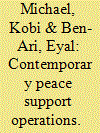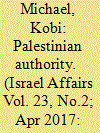| Srl | Item |
| 1 |
ID:
124348


|
|
|
|
|
| Publication |
2012.
|
| Summary/Abstract |
It is generally accepted that the peace process, launched in 1993, went off the tracks and failed to meet the expectations of the interested parties: the state of Israel, the Palestinian Authority, and the international community. The international discourse plays down the historical depth of the dispute and everything which pertains directly to the Jewish religious, national, and cultural heritage that dates back more than three millennia in the Land of Israel. Also absent from the international discourse is an awareness of the rich academic and theoretical foundation of knowledge with regard to peacemaking. Concepts such as the positive peace, reconciliation, "ripeness," "stable peace" or "hurting mutual stalemate" have not been integrated into the discourse.
|
|
|
|
|
|
|
|
|
|
|
|
|
|
|
|
| 2 |
ID:
107666


|
|
|
|
|
| Publication |
2011.
|
| Summary/Abstract |
In this article the authors examine two set of issues that constrain contemporary peace support operations (PSOs): one centered on the kinds of knowledge prevalent in PSOs and the second involving the organizational structures that characterize them. The authors' aim is to show the deep discursive and structural limitations and contradictions that continue to characterize the actions of armed forces and the dominance of militaristic thinking within PSOs. This article centers on multidimensional peacekeeping marked by emphasizing two main points in regard to the complex nature of such peacekeeping. First, Western military thinking is still dominant in the professional discourse of peacekeeping despite the fact that in many cases it is less relevant to the arenas where it is applied (in weakened or failed states). Second, forces in second-generation peacekeeping missions are by definition a form of hybrid organizations, and therefore conceptual changes in regard to PSOs not only involve the realm of knowledge but also entail practical consequences for the very organizational means used to achieve their aims. The authors' analysis demonstrates the blending, hybridization, and linkages that are an essential part of PSOs as processes that carry both advantages and disadvantages for organizational action.
|
|
|
|
|
|
|
|
|
|
|
|
|
|
|
|
| 3 |
ID:
079236


|
|
|
|
|
| Publication |
2007.
|
| Summary/Abstract |
The changes in the nature of warfare and its transformation toward Low Intensity Conflict (LIC) intrastate conflict have challenged the patterns of interaction between the political and the military echelons in Israel. It seems that the political echelon's superiority is maintained at the institutional and formal levels, but on the substantive level, which demands relying on knowledge and systematic staff work, the political echelon's position is weakened and loses its validity.
Introducing the military echelon in Israel as an epistemic authority regarding the violent confrontation and the main outlines of the military knowledge development process might clarify why the absence of the required dialogue between the echelons and the weakness of the intellectual effort increased the military's influence over the shaping of Israeli conflict-management strategy. The argument's validity and its explanatory power can be found relevant for other countries whose militaries are deeply involved in the management of LIC.
|
|
|
|
|
|
|
|
|
|
|
|
|
|
|
|
| 4 |
ID:
077867


|
|
|
| 5 |
ID:
151821


|
|
|
|
|
| Summary/Abstract |
Despite the vast resources poured by the international community into the construction of Palestinian institutions, the PA has failed to build and maintain the infrastructures required for the establishment of a vital, democratic and functioning state. By most common parameters, the PA is a failed entity. Taking into account this experience and the consequences of the last six years of Arab upheavals, characterized by the increasing phenomenon of failed states, there is a need for a paradigm shift that will increase the likelihood of a functioning Palestinian state after a peace agreement with Israel is signed and reduce the risk of its being a failed state that would pose a complex, dangerous challenge for Israel and the neighbouring Arab states.
|
|
|
|
|
|
|
|
|
|
|
|
|
|
|
|
| 6 |
ID:
151018


|
|
|
|
|
| Summary/Abstract |
Jihadist terror is a multidimensional challenge that compels unique difficulties on compatibility between the military campaign and the political goal. Compatibility between military campaigns and political goal requires a deeper understanding about the Jihadi terrorism phenomenon that could be achieved by a strategic and diagnostic learning process. Such learning requires certain characteristics, which enable the creation of open discourse. This article introduced definitions of closed and open discourse, characterized the required conditions for creating open discourse, and explained the linkage between strategic learning and open discourse. This article aims to add another theoretical layer to Rebecca Schiff’s “targeted partnership” concept by elaborating on the essence of the encounter and discourse between the political and the military echelons in the context of terrorism in the Middle East, using examples from the American and Israeli experience. The concepts of “Discourse Space” and “Diagnostic Learning” are corresponding with Schiff’s concept and accomplish it.
|
|
|
|
|
|
|
|
|
|
|
|
|
|
|
|
| 7 |
ID:
091771


|
|
|